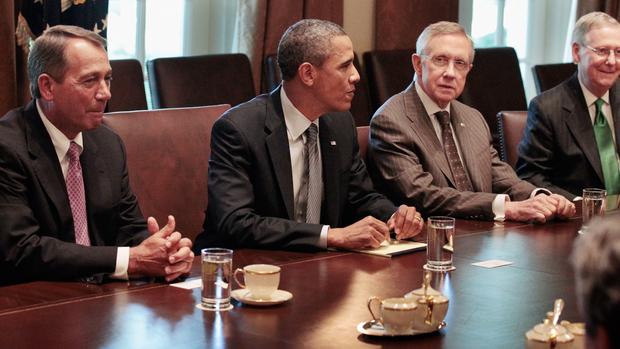Senate passes bill to end debt showdown
Updated: 2:49 p.m. ET
President Obama signed a bill to raise the nation's borrowing limit on Tuesday, just hours after the Senate voted 74-26 in favor of the deal that will cut government spending by trillions and effectively raise the debt ceiling through the end of 2012.
Nineteen Republican senators and six Democratic senators voted against the bill, as did one Independent senator who caucuses with Democrats. The bill was brokered Sunday night in last-minute negotiations between the White House and congressional leaders.
Senate Minority Leader Mitch McConnell, R-Ky., a key player in the negotiations, and Majority Leader Harry Reid,D-Nev., both backed the bill - paving the way for its easy passage in the Senate.
Obama signs debt limit bill after nasty fightA summary of the debt ceiling compromise
The six Democrats who voted against the measure on Tuesday were sens. Kirsten Gillibrand (N.Y.), Tom Harkin (Ia.), Frank Lautenberg (N.J.), Bob Menendez (N.J.), Jeff Merkley (Ore.) and Ben Nelson (Neb.). Sen. Bernie Sanders, I-Vt., also voted against the measure.
The plan will cut nearly $1 trillion in government spending over the next 10 years and raise the amount of money the U.S. is legally allowed to borrow by enough to avoid another showdown on the matter before next year's presidential election.
It will also create a special congressional committee of a dozen members -- three from each party from the House and the Senate - that would be tasked with coming up with recommendations for $1.5 trillion in further deficit reductions by Thanksgiving. Those reductions could include cuts from defense and social safety net programs, as well as changes to the tax code. If the recommendations are not created or approved by Congress by the end of the year, there will be more than $1 trillion automatic spending cuts unless a balanced budget amendment to the Constitution is sent to the states.
CBSNews.com special report: America's debt battle
In remarks following the vote, President Obama called the deal a "first step" toward "ensuring that as a nation we live within our means," and reiterated his hope for a "balanced approach" in future negotiations.
"This compromise guarantees more than $2 trillion in deficit reduction. It's an important first step to ensuring that as a nation we live within our means," he said.
Mr. Obama added that the compromise "requires that both parties work together on a larger plan to cut the deficit, which is important for the long-term health of our economy. And since you can't close the deficit with just spending cuts, we will need a balanced approach, where everything is on the table."
"Everyone will have to chip in," he said. "That's only fair. That's the principle I will be fighting for during the next phase of this process."
The legislation was brought to a vote in the House Monday night after weeks of contentious negotiations and closed-door deal-making that fell apart on multiple occasions. Despite serious reservations among both Republicans and Democrats, the bill passed 269-191 with bipartisan support in the House.
Deal sets up December showdown, despite talk otherwise
Both fiscally-conservative Republicans and liberal Democrats rejected the deal, with the former saying it does not go far enough to address the nation's debt and deficit crisis and the latter complaining it cut too much and did not include revenue increases. Though the deal will reduce the deficit by trillions of dollars, it still leaves the nation facing a projected $22 trillion debt ten years from now - an increase of more than $7 trillion from today. Ratings agencies have said that they could still downgrade the nation's Triple-A credit rating even with the deal.
In a press conference following the vote, Reid told reporters that while "neither side got what they wanted,"in the end, "the two sides came together."
"That's how our system works," he said. "That's what compromise is all about."
Still, Reid emphasized that the fight to include revenues in the package was far from over.
"We look forward to the work on the [congressional] committee to make sure that millionaires and billionaires and corporate jet owners and people who have that yachts who get tax benefits, oil companies who get these huge tax subsidies -- that that's in the mix of thinking what goes on," he said. "That's what this select committee is going to be about."
"I did not vote for this with a great deal of enthusiasm because the down payment on the deficit included in this bill comes primarily from working families and those who are struggling in America," added Sen. Dick Durbin, D-Ill., in the same press conference. "If we are going to have true deficit reduction and address this debt, we have to put everything on the table and bring everyone to the table for shared sacrifice."
In a statement following the vote, House Speaker John Boehner called the bill's passage "a positive step forward."
"This is a positive step forward that begins to rein in federal spending, but it's only a step," he said in the statement. "We should save the celebration for when a Balanced Budget Amendment is ratified, the deficit is fixed, and our economy has returned to creating jobs."
McConnell noted in remarks before the Senate vote that while the weeks-long, contentious back-and-forth over the issue may have been unpleasant, "it was a debate that Washington very much needed to have."
"The legislation that the Senate is about to vote on is just a first step - but it is a crucial step toward fiscal sanity," he said.
Now that Mr. Obama has signed the bill, the debate will shift to the question of which lawmakers will serve on the bipartisan "super committee" tasked with coming up with recommendations for $1.5 trillion for the second round of reductions.

